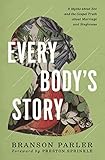On sexual ethics, Christians and their secular neighbors tend to hold markedly different views. But these differences can obscure how both groups are living according to stories and myths about the meaning and purpose of human bodies—often without knowing it. In Every Body’s Story: 6 Myths about Sex and the Gospel Truth about Marriage and Singleness, Branson Parler examines the myths most influential outside the church (individualism, romance, materialism) and within it (anti-body theology, legalism, and the sexual prosperity gospel).
Every Body's Story: 6 Myths About Sex and the Gospel Truth About Marriage and Singleness
Zondervan
256 pages
$9.07
Writer and campus minister Rachel Gilson spoke with Parler—director of theological education at The Foundry, a ministry based in Grand Rapids, Michigan—about the relationship between our bodies and the central truths of the gospel.
Your title raises a question: How does a body tell a story?
Every story entails an embodied way of life. Bodies point, through what they do, to the larger story they’re part of. So if I really want to understand what you’re believing in your bones, then I’ll look at what you’re doing with your body. Work, rest, money, greed, sex—we tend to see these things as disconnected pieces rather than woven together in a single story.
It’s easy to talk about what we believe with our minds. It’s trickier to discern how the way I’m living reveals my deepest beliefs about the good life. With rhythms of work and rest, or Sabbath, for instance, it’s one thing to say I believe God will take care of me. It’s quite another to actually cease doing work.
Many of us are unintentional about the story we’re telling. But if you watch someone over the days, weeks, and months, you’ll see that story more clearly.
You address secular and Christian myths about the body. What inspired you to include myths that influence both sides?
On the one hand, it comes from wanting to help myself, my students, and my church to understand our own culture. We need to be aware of the stories that shape and form us, and these are especially difficult to identify in one’s own culture, because they have a taken-for-granted quality. As Christians, we can be too quick to think, Well, secular culture is living out problematic stories, but the church has it right.
Especially when it comes to questions around sex, bodies, marriage, and singleness, most people like me—who grew up in the church during the purity-culture years—only heard a theology of “No,” and never the “Yes” of self-giving love the gospel offers. So we can acknowledge that the broader culture falls short of the gospel, but we also need to see where our church culture falls short as well.
After researching and writing the book, which myth do you think American evangelicals are mostly likely to believe and to propagate?
I would say the myth of legalism, this idea that we’re justified not by grace but through our own good behavior. Maybe this is shifting, but I’m guessing that many churches still operate on the model of “behave, believe, belong,” in that order. In other words, the first thing we look for in prospective members is whether they have their act together, at least with respect to the things we consider important.
Because of this behave-first model, we don’t always know how to engage with folks who, in an increasingly secular culture, are likely to receive the call to behave as oppressive. We end up drawing unhelpful lines between insiders and outsiders. Legalism ends up being a hinge for the other myths, because if you fall for that one, then it cascades into falling for all the others.
Why would you ever feel the need to write, not once but twice, that “Jesus has a penis”?
[Laughing] Does that seem excessive? We don’t take our own bodies seriously because we don’t take Jesus’ body as seriously as we should. In the book, I talk about how we’re saved through the sexed, gendered body of Jesus. This shows me that God doesn’t stand back from his creation but instead takes on humanity, which means having a body. And I was trying to make that idea sound as scandalous to today’s good Christians as it was when it was first preached in the ancient world.
The New Testament says the Word became flesh in Christ. We can sometimes have this intellectual distance from that reality, which causes us to underestimate God’s involvement with the world. With my students, I’ve pointed out that Jesus passed gas, and they’re always unsure how to respond, because that doesn’t fit with their imagery of Jesus. I’m trying to find ways to remind people that God’s Word is strange, and possibly the strangest thing about the Word is that the Word became flesh.
As Christians today, what is the body question we should be thinking about more often?
I hesitate to mention this one, but I think that when we’re asking what our bodies are for, and what is sex for, we need to think more about reproductive technology and contraception. As with some other questions, people tend to think of these as isolated ethical issues, but they reveal an underlying story.
And I don’t want to make anyone feel guilty about choices they’ve made. In fact, one reason I started thinking about these questions more deeply was because of my journey with fatherhood. But people tend to think of vasectomies or contraception as personal decisions instead of asking what they say about the nature of our bodies or the nature of reality. I don’t want to bind anyone’s conscience. But your conscience does need to be bound by Scripture and Christian community, as opposed to saying, “I have two kids, and any more just seems like a hassle.”
You often point to the importance of singleness alongside marriage. Why?
We have sometimes been very unbiblical in our approach to singleness. We haven’t taken Paul or Jesus seriously enough. Singleness makes sense in our story because the church is the household of God, and God’s family is our first family. Marriage is not ultimate. We are all primarily members of the body of Christ. We are to love each other as siblings, to make vows to each other, to live life together. That is for all disciples, and no one is second class based on marital status. We need to recover belonging to each other more fully. Singleness has loneliness, and marriage has loneliness—but none of us in Christ is truly alone.
What’s your deepest hope for this book?
My hope is for people to see the connection between the good news of the gospel and what we do with our bodies. Our Christian subculture has run through purity culture, the sexual prosperity gospel, and anti-body theology, and we’ve seen where those ideas lead. We’ve hit, I hope, a God-ordained dead end.
But I think secular culture is also realizing that its own stories aren’t holding up either. One recent book, Christine Emba’s Rethinking Sex, looks at this dynamic, saying that we’re freer than we’ve ever been and we’re also miserable. So my hope is that this book helps Christians live and tell the gospel such that other people feel the force of it, even if they end up rejecting it. We want other people to see the “Yes” of the gospel, because that’s what draws us. Only toddlers can live on a diet of “No,” and we are stuck in a lower stage of development if that’s the only way we can talk about these things.











